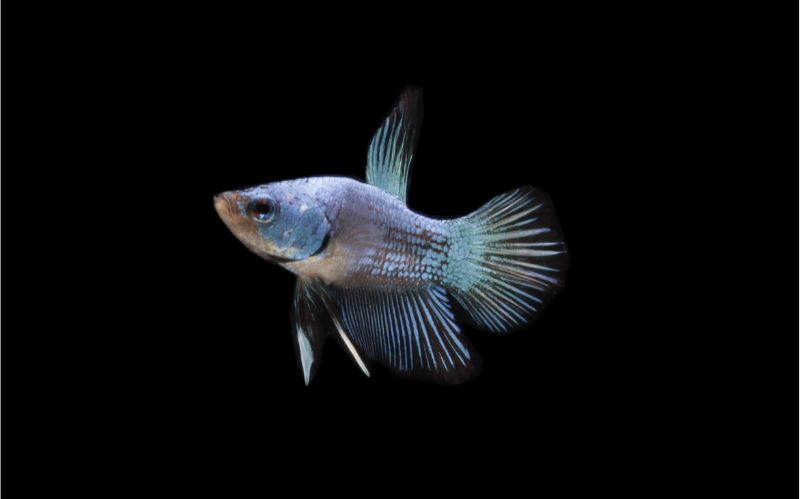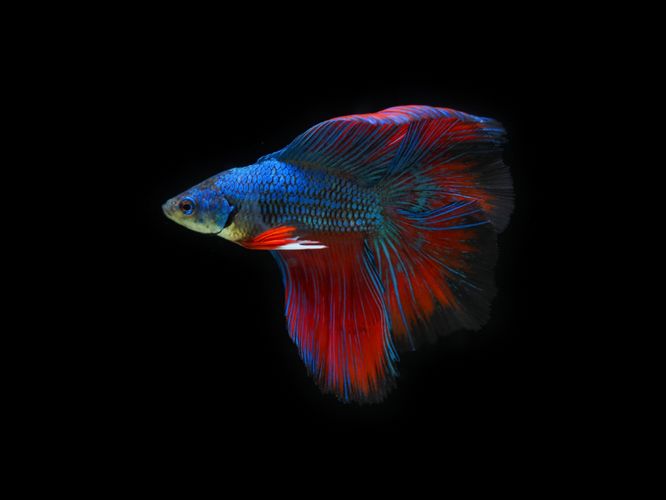Have you noticed that your betta fish has become more elusive lately? Does he hide inside his favorite decoration all day, or hide within the leaves of a plant? Maybe you’ve even gone a few days without seeing him because he’s hiding away.
If any of this has happened to you, you’ve likely wondered, why is my betta fish hiding?
Betta fish may hide for many reasons, but it’s not usually good. We’re going to cover the most common reasons a betta might go into hiding, and what you can do to solve it.

Is It Normal To Find My Betta Hiding?
Bettas are active fish, so it’s not normal for them to hide away. Usually, if your betta is hiding, it’s because something’s wrong. The good news is that whatever causes it, it’s usually a simple fix.
Bettas may hide because of poor water quality, or loud noises. It could also be a lack of decorations or aggressive tank mates. In more extreme cases, your betta may be hiding because it’s sick.
Poor Water Quality
A very common reason that bettas hide is because the water quality is off. If you notice your betta hiding, the first thing you should do is test your water quality. The best way to do this is by using the API Master Test Kit.
Even if you try your hardest to keep the tank clean, water quality can change very quickly.
Ammonia or nitrite toxicity can make your betta feel sick, so they will hide away where they feel safer.
Luckily, poor water quality is usually easy to fix. Hopefully, you’ve already cycled your tank. If you have, it should only take a quick aquarium cleaning to have the water back to normal.
Do a 25-50% water change and vacuum the gravel. You may need to change the filter media as well. After cleaning, recheck the water parameters to see if they’ve gone back to normal. If they have, your betta should shortly come out of hiding.
Chlorine is also poisonous to your fish and can cause them to go into hiding. It’s important to add a de-chlorinator like API Stress Coat to new water before adding it to your tank.
The Filter Is Too Strong
Bettas have long, flowy fins, and they don’t swim well. They need water that doesn’t have much flow.
If your betta is hiding, take a look at the filter. Is it putting out a strong flow of water? If the answer is yes, consider buying a new filter or adding a sponge to slow down your existing filter.
Loud Noises
A betta may hide because of loud noises that are scaring it.
You should avoid making loud noises around your betta’s tank to avoid this. Don’t tap on the glass, don’t stomp around the tank, and don’t play loud music around the tank.
At all costs, avoid keeping your betta in an area where there is consistent loud noise. This may scare your betta into hiding permanently, and it won’t even come out for food.
It’s not the noises themselves that scare the betta. Rather, it’s the vibrations in the water caused by the noise.
The Lights Are Too Strong
Of course, you’re going to want lights in your tank, they make it easier to view your beautiful fish. But, if your lights are too strong, they can hurt your betta’s eyes.
You shouldn’t keep the lights on 24/7. Your betta needs a day and night cycle like humans. Try to only keep the lights on about 6 hours a day.
Too Few Decorations
This may seem counterintuitive. But, your betta may be hiding because there are not enough hiding spots in the tank.
Bettas are small, slow-moving fish. So, they feel vulnerable and exposed when kept in tanks that are too open. If you want to see your betta out and about more often, you should keep your tank heavily decorated.
Plants make your betta feel secure without obscuring your view of your fish. We recommend using live plants as they’re easy on your betta’s fins, and they add precious oxygen to the tank.
Your Betta Is Sick

Like most animals, bettas will go into hiding when they’re sick and injured. Although bettas are fighters, they’re also very small.
In the wild, bettas regularly come across predators that are much larger than them. When they come across these predators, they can either try to hide or flee.
A sick or injured betta is going to be too weak to flee, so its only option is to hide.
Most captive-bred bettas don’t have to worry about predators. But, captive bettas have retained this instinct from their wild cousins.
Aggressive Tank Mates
Usually, people worry about housing their betta with tankmates. They worry the betta will attack the other fish. Oftentimes, the opposite is actually true.
Bettas are usually peaceful with other tankmates. Just avoid other bettas and fish with long-flowing fins that resemble bettas.
Once again, betta fish are small, slow-moving fish, so they don’t like confrontation very much. Usually, bettas will only fight other bettas. Even then, they will flare at the other betta. They try to scare it away before resorting to attacking.
If your betta is living with an aggressive tankmate, it might go into hiding. Your betta will become extremely stressed, especially if the other tankmate keeps attacking. Because bettas are so delicate, they can suffer severe damage to their fins.
The only solution to this problem is to move the aggressive tank mate, or the betta, to a separate tank.
To prevent this, research each new fish species before attempting to move it in with your betta. Here is a list of aggressive tankmates you should always avoid:
- Other Bettas!
- African Dwarf Frogs
- Most Barbs
- Cichlids
- Crabs
- Goldfish
- Gouramis
Here is a list of tankmates that are generally safe for bettas:
- Corydoras
- Danios
- Large Shrimp
- Loaches
- Minnows
- Otocinclus Catfish
- Platys*
- Rasboras
- Snails
- Tetras*
*Some of the larger-sized platys and tetras may pick on your betta.
Where In The Tank Do Bettas Like To Hide?

Bettas will hide anywhere they can fit. Some of the most common places to hide include the plants, decorations, and behind the filter.
How Do You Know If Your Betta Fish Is Sad?
Many people don’t realize that betta fish can develop depression as humans do. Although this is less common, it could be the reason your betta is hiding all the time.
So, how are you supposed to know if your betta is depressed?
Depressed bettas act like sick bettas. Your betta will become lethargic and mope around the tank. It may also become uninterested in food.
Test The Water
The first thing you should do when noticing this behavior is to test the water. Observe your fish for signs of illness or infection. Is everything in your tank perfect? Then, your betta may be depressed.
Lacking Enrichment
Bettas may become depressed if they aren’t receiving enough enrichment. Many people like to place their betta in a small bowl or vase where they don’t have much room to swim. Bettas are active fish who like to move around the tank.
Your betta will also be unhappy if there aren’t enough decorations in the tank. They need enrichment like any other animal.They will become bored in a tank that is bare and unappealing.
Cure Your Betta’s Depression!
Fortunately, it’s usually easy to cure your betta’s depression. To make it happy, start by upgrading its tank. Bettas need at least 5 gallons to be happy.
Also, be sure to provide lots of decorations and places to hide.
If your betta is already in a large tank with lots of decorations and is still depressed, try changing up its tank. Your betta can get bored of having the same scenery over and over again.
Tankmates
To give your betta something to interact with, you could also try adding a few tankmates in with your betta.
Flaring
You should buy a small mirror to show your betta once a day. This will entice your betta to flare which gives them some much-needed enrichment. Flaring also boosts their metabolism. It can prevent them from becoming bloated or constipated.
Just don’t hang the mirror permanently beside the tank — this will stress your betta out.
Teach Your Betta A Trick
Some people even teach their bettas tricks. Bettas are active little critters who love interacting with their caretakers. You can hold your finger slightly above the water surface to teach them to jump. It may take a few tries, but most bettas will learn how to jump to your finger.
Bettas are so smart that you can even teach them how to jump through a hoop!
That’s right, you can buy a small hoop for your betta to jump through and guide it through with your finger. Check out this video to learn how.
Conclusion – Why Betta Fish Hide
Your betta fish hiding could be caused by many things. Luckily, most of these are solvable.
In most cases, your fish is hiding because it’s stressed. This may be due to poor water quality or aggressive tank mates. It could be a lack of decorations, or because of loud noises. In extreme cases, your betta may be hiding because it’s sick or injured.
Whatever the case may be, you should determine the cause and try to fix it. Your betta will thank you.

